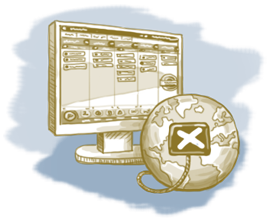 The fine blending of skill and automation can be illustrated with drivers and automobiles.
The fine blending of skill and automation can be illustrated with drivers and automobiles.
In the early part of the twentieth century, for example, “automation” was crude: many cars had to be started by cranking them from the front. Once started, the driver had to know where the gears were, how to operate a clutch, and how to steer and keep the car on the road once some speed was attained. Since it was a new technology at the time, many drivers were not very skilled and collisions with wagons, trees, buildings and other items were common. In this case both the automation and the skill levels were pretty rudimentary so even in combination they were risky.
Today a driver with some basic skills taught in high school can pilot an automobile—which is now nearly entirely automatic and starts and drives with great ease—down a highway at speeds that would have made that driver from 1903 collapse from heart failure. Yet now it’s an everyday occurrence.
Moving over into the realm of the sales force, we find a similar set of elements with the skill of selling supported with computerized automation in the form of a CRM solution. But as with the car and driver, both the salesperson and CRM solution must be brought to certain levels before they work well as a unified whole.
CRM Solution
We’ll start with CRM solutions since when they first came around there was sort of an unwritten promise that on their own they would send sales through the roof. It took a number of years—and unfortunately, in many cases, thousands or millions of dollars invested—for companies to realize that automation by itself would not take sales to a “whole new level.”
This was especially true with a particular (and unfortunately leading) group of CRM applications that were incredibly complex and difficult for salespeople to learn. Since such solutions were primarily designed for management to monitor sales and not for salespeople to control their own pipelines, sales reps came to loathe them.
Automobiles had to come up through the levels, from clumsily operated manual to smoothly moving automatic. In the case of CRM solutions, they have had to come from simple contact management solutions, up through horribly complicated “feature rich” applications, and are finally now reaching a level of intuitive, flexible simplicity that possesses the needed functionality to truly empower salespeople and sales management.
But of course that optimum level of automation is only half the story.
Sales Skill
Just as a car won’t drive itself, a CRM solution won’t sell anything on its own. In the hands of an expert sales rep, though, CRM is a wonderful tool that will assist that rep in moving a sale skillfully and rapidly from lead to close.
A salesperson certainly needs various abilities: the ability to listen to the what the prospect is saying and isolate the important points for answering back; the expertise in the product and the market so as to know exactly what to pitch; that “x-factor” needed to engender trust from the prospect in the salesperson’s product and company. Fortunately, these skills can all be learned and acquired.
How? It usually starts with some innate abilities and a keen interest in selling. It is helped along by apprenticeship with an experienced rep and nurtured by sales management coaching and straight experience itself.
In Combination
A salesperson with the right skills, combined with a leading-edge CRM solution, selling a product or service that is actually needed by prospects and customers, is virtually an unstoppable force.
But a whole other level can be attained if the CRM solution also encompasses continued training. As reps learn further tricks to getting prospects more rapidly through sales pipeline steps, those tips can be quickly written up and saved in CRM at the various steps in the pipeline. Sales expertise can be imported from outside the company (e.g. from sales training experts) and placed along the pipeline where it applies. It becomes a solution that continuously improves with time.
There is a perfect marriage of sales force skill and automation. Fortunately today it is relatively easy to bring about.
What kind of CRM solution could do this for your company? Sign up for one of our free webinars and find out.



















